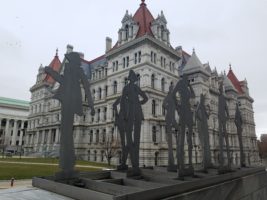 Passage of the 2020 New York state budget left a number of important public health issues on the table, which will have a negative impact on the health of all New Yorkers for years to come. The AHA is disheartened that all flavored tobacco products were not prohibited from sale and that a model school wellness policy wasn’t adopted.
Passage of the 2020 New York state budget left a number of important public health issues on the table, which will have a negative impact on the health of all New Yorkers for years to come. The AHA is disheartened that all flavored tobacco products were not prohibited from sale and that a model school wellness policy wasn’t adopted.
“The 2020 Budget included a number of tobacco control measures aimed at reducing the youth e-cigarette epidemic, including a restriction on tobacco products being sold in pharmacies, a prohibition on coupons intended to reduce their price, ingredient disclosure, and a restriction on advertising near schools,” said Theresa Petrone Butts, chair of the Capital Region Board of Directors and member of the New York State Advocacy Committee of the American Heart Association. “These policies are an important step in our fight to end tobacco use and nicotine addiction, but there is still more that needs to be done. We are disappointed that New York State did not fully commit to ending the sale of all flavored tobacco products.”
Some of the difficulties the American Heart Association outlined with the adopted measures include:
- Exemption of menthol cigarettes and other flavored tobacco products from the prohibition on the sale of flavored e-cigarettes. This means that Big Tobacco will continue to lure youth to their dangerous products with flavors marketed to them.
- Menthol cigarettes are considered a great starter product for youth since menthol soothes and numbs the throat. This is fine in a cough drop, but not in a cigarette because it makes it easier to startan addiction and harder to quit.
- Eliminating the sale of flavored e-cigarettes but not menthol cigarettes also perpetuates the disproportionate marketing and advertising done by the tobacco industry in African American communities. This results in increased health disparities and higher rates of death and tobacco-related diseases among communities of color.
- Creating a loophole that may allow flavored electronic products to return to the market at a later date.Under no circumstances should products that hook youth to a lifetime of nicotine be allowed on the market.
“Adding to the problem is the World Health Organization’s recent news that smokers are likely more vulnerable to severe and potentially life-threatening cases of COVID-19. With the COVID-19 pandemic devastating New York, we needed our legislative leaders to do more to encourage smokers to quit, and youth to never start. Ending the sale of menthol cigarettes would have done that,” Petrone Butts said.
The Heart Association was also disappointed that neither a model school wellness policy, nor a dedicated appropriation aimed at improving school wellness policies, were in the budget.
“With the federal government once again trying to roll back school nutrition standards, New York had an opportunity to be a leader in improving the school environment for students,” said Petrone Butts. “The statistics around children’s wellness are sobering. One in five children faces mental illness; one in six struggles with hunger; and one in three has obesity placing them at an increased risk of developing life-long health issues such as heart disease and diabetes. We will continue to push for a model school wellness policy and the appropriations necessary to ensure all districts have the resources they need to help kids be healthier and learn better so they can reach their full potential.”
Again this year, an increased tobacco tax and funding for the Tobacco Control Program were left off the table.
“With 12.8% of New York’s adults still smoking cigarettes, and more and more youth addicted to nicotine in e-cigarettes, the Tobacco Control Program needs all the resources it can get to help share information and help with prevention and treatment,” said Petrone Butts. “We were also hoping to see an increase of $1.50 to the state’s tobacco tax. Youth are affected by price increases, so a simple increase in the tobacco tax would have been an impactful step in our fight to end tobacco use in New York. Moreover, this revenue could have gone to the Tobacco Control Program.”
Funding for the Obesity Prevention Program and the Hypertension Prevention program remained level at $5.9 million and $692,000, respectively.
“Heart disease, of which hypertension and obesity are risk factors, is the leading cause of death. Prevention is critical when it comes to obesity and hypertension, and the numerous chronic diseases stemming from them,” said Petrone Butts. “While no increase in the appropriations means these programs will not have the resources necessary to be as effective as possible, we know that these are extraordinary times and we hope that these programs can be funded more fully in years to come.”
The American Heart Association will continue to advocate with the state Legislature for sales restriction on menthol cigarettes and other flavored tobacco products as well as the School Wellness Policy.
“Sen. Brad Hoylman and Assemblymembers Linda Rosenthal and Rodneyse Bichotte have been strong proponents of legislation to eliminate the sale of flavored tobacco products,” said Petrone Butts. “We will continue to work to eliminate the sale of menthol cigarettes and all other flavored tobacco products (S.428-B and A.8808). Likewise, we will continue to push for the School Wellness Policy that Sen. Alessandra Biaggi and Assemblymember Benedetto (S.7767 and A.7607-A) are sponsoring.”
“These are tough times, and the American Heart Association continues to be a relentless force for a world of longer, healthier lives,” Petrone Butts said.